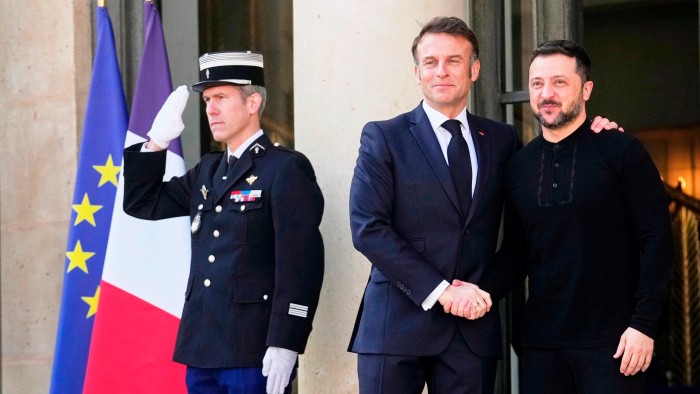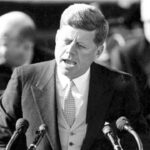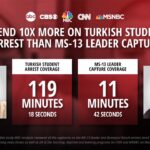French President Emmanuel Macron has said a so-called reassurance force of European troops in post-conflict Ukraine would take shape over the next month, with France and Britain sending military officials to Kyiv to develop specific plans.
“I think that within three to four weeks, we’ll have those two questions settled: the structure of the Ukrainian army, the reassurance forces, and a fairly precise action plan with the needs, as well as the contributors,” Macron said on Thursday after hosting Ukraine President Volodymyr Zelenskyy and more than 30 countries, including Britain, that are part of a “coalition of the willing” backing Kyiv.
France and the UK have been co-ordinating efforts for a European deployment to Ukraine to secure the most sensitive sites such as cities, ports and official buildings — in an attempt to act as a deterrent against any future Russian aggression.
But the coalition scaled back its ambition in recent weeks amid divisions among EU countries, exacerbated by the refusal of US President Donald Trump to commit to guarantee that the force could rely on US intelligence and logistics.
UK Prime Minister Sir Keir Starmer said London had hosted “over 200 military planners from 30 countries” this week, and that countries were “coming forward with contributions on everything from logistics and command and control, to deployments on land, air and sea”.
“This is Europe mobilising together behind the peace process on a scale we haven’t seen for decades,” he said.
But while some countries such as Denmark and the Baltic states have agreed to participate, many others such as Poland and Greece are reluctant to commit troops and military equipment to such a force, especially if the US does not provide support.
French and British military officials “will go there so the Ukrainians can tell us exactly what they need and what sites they want them to be deployed”, said Macron. “Nothing is off the table, so maritime, air and ground” capabilities are being considered.
Zelenskyy urged his European allies to move swiftly: “We need one clear plan that we all agree on and start implementing.”
“It’s obvious that the strength and size of the Ukrainian army will always be a key guarantee of our security,” he added. “We need to build everything around that — our defence forces, their equipment, their technology, their effectiveness — this is the foundation.”
The Paris meeting comes amid nervousness across the bloc regarding a Black Sea ceasefire brokered by the US, which Russia has yet to comply with.
“We agreed here in Paris today that it’s clear the Russians are filibustering,” Starmer said. “The collective feeling is Russia is playing games [and] that Putin is back to his old ways.”
European Commission President Ursula von der Leyen said the bloc’s sanctions against Russia would remain in place until there was “just and lasting peace in Ukraine”. She also added the EU would frontload its portion of a €50bn loan to Ukraine, in a move that would give Ukraine much-needed cash to buy more weapons.
A US proposal for a 30-day ceasefire, while agreed by Kyiv after the US briefly suspended military aid and intelligence sharing, was rejected by Russian President Vladimir Putin. Instead, Moscow has pledged to pause attacks on Ukraine’s energy infrastructure for 30 days and to cease hostilities in the Black Sea — but only after the west lifts sanctions on certain Russian lenders.
Macron and Zelenskyy have also said it was too early to drop the sanctions imposed on Russian lenders. They also suggested Moscow was not negotiating in good faith, although they were careful not to criticise Trump.
Macron on Wednesday said the European force would respond if Russia attacked it. “If there was again a generalised aggression on Ukrainian soil, these armies would, in fact, be under attack and then it’s our usual framework of engagement . . . Our soldiers, when they are engaged and deployed, are there to react . . . and, if they are in a conflict situation, to respond to it.”
But several leaders, including Italy’s Giorgia Meloni, have balked at deploying troops to Ukraine, deeming the discussion as “premature”. Countries on the eastern flank are also wary of committing soldiers unless they can secure protection from other Nato deployments on their territory.
German Chancellor Olaf Scholz said at this time it was “not even certain whether there will be a debate, . . . what kind it will be, whether it will be about international troops”.
He reiterated US security guarantees were “crucial”, so that Washington feels “jointly responsible with us for Ukraine’s security and for peace and security in Europe”.
Yet France hinted it was willing to deploy troops to Ukraine even in the absence of US support, emphasising the need for Europe to ensure its own security.
“We must hope for the best and prepare for the worst,” Macron said. “And so, my wish is that the Americans remain engaged at our side, and my wish is that the Americans provide real support, even active participation in all of this. But we must prepare for a situation that their support would be less significant.”
Additional reporting by Anne-Sylvaine Chassany in Berlin, Eleni Varvitsioti in Athens and Lucy Fisher in London







